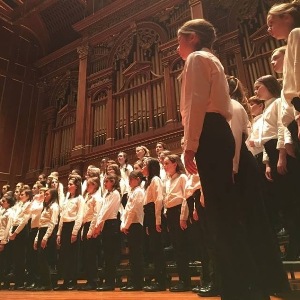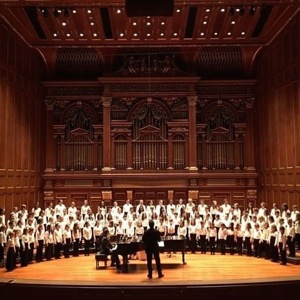 T’S NEVER just about the music. Music is always about something greater. With sacred music it is about prayer, worship, and putting God at the center. Furthermore, singing in a choir brings about benefits that go well beyond that of making beautiful music. Words are fully inadequate to describe the power of music.
T’S NEVER just about the music. Music is always about something greater. With sacred music it is about prayer, worship, and putting God at the center. Furthermore, singing in a choir brings about benefits that go well beyond that of making beautiful music. Words are fully inadequate to describe the power of music.
I had the opportunity to compose a work for the Elementary Honor Choir for the American Choral Directors Association Eastern Division. It was recently premiered at Boston’s historic Jordan Hall. Fernando Malvar-Ruiz, Director of The American Boychoir would be conducting. Understanding music education as he does, Malvar-Ruiz has often stated that the mission of the American Boychoir is not music. It is education. With this philosophy in mind, he asked me to compose something intriguing.
THE SCORE IS AVAILABLE HERE:
• Dona Nobis Pacem | SSA, Piano, Cello • RJC Cecilia Music
While not a liturgical work, we agreed to a universal message Dona nobis pacem. “Grant us peace.” He wanted Latin to teach pure vowels. He wanted easily singable lyric phrases suitable for children’s voices. (He also understands that Gregorian Chant is great tool for teaching children.) Finally, he asked for quotes from St. Francis of Assisi, Gandhi, and Martin Luther King, Jr. I jumped at this idea, knowing this would be about much more than music.
 HIS HONOR CHOIR OF ONE-HUNDRED TWENTY-TWO CHILDREN (aged nine to twelve) had less than seventy-two hours to learn and memorize a program that included works of Bach, Malvar-Keylock, and others in a variety of styles and languages. Malvar-Ruiz asked me and composer Melissa Malvar-Keylock to discuss our compositions and answer questions from the children. And what brilliant questions they were!
HIS HONOR CHOIR OF ONE-HUNDRED TWENTY-TWO CHILDREN (aged nine to twelve) had less than seventy-two hours to learn and memorize a program that included works of Bach, Malvar-Keylock, and others in a variety of styles and languages. Malvar-Ruiz asked me and composer Melissa Malvar-Keylock to discuss our compositions and answer questions from the children. And what brilliant questions they were!
Some asked about why I chose certain harmonies. One asked why the entire piece was not in Latin. Several questions were about the choice of the specific quotes. This opened up a great deal of historic discussion from St. Francis’ famous prayer to the direct connection between Gandhi and Martin Luther King, Jr.’s use of nonviolent techniques to overcome oppression.
Many were so curious about the composition and creative process. One asked for advice I could offer about becoming a composer. My quick advice to this bright ten or eleven-year old was to not only develop the technical skills, but to develop the heart, mind, and soul. Who we are as a person gives birth to our music. What I wish I had added was this: Develop your own unique voice. Accept technical criticism, never let anyone dismiss or criticize your unique musical voice, because this is you. I really wish I said that. I hope she reads this.

 HEN, AS IF one conclusion must lead to another, the final question was fascinating, especially from such from a young child: “What expectations do you have from us?” This is an incredibly mature and insightful thought. It was as if I had planted this question because it led to a question that I had for all the children.
HEN, AS IF one conclusion must lead to another, the final question was fascinating, especially from such from a young child: “What expectations do you have from us?” This is an incredibly mature and insightful thought. It was as if I had planted this question because it led to a question that I had for all the children.
I told them I had a question for them. I said I suspected they were already doing this, but I want them to consider my request. So then asked them, “What happens to the text at measure 132?” They explained the text changed from “Grant us peace” to “Peace be with you.” (The words Jesus spoke after His resurrection. The words he spoke when they were afraid and hiding, after His resurrection.)
While I did not mention Jesus specifically in a secular and mixed setting, I asked them if they could do what St. Francis prayed for: “Can you be an instrument of peace?” I was clear I didn’t mean just when they sing this piece. I told them I didn’t just mean for the concert. But can you be an instrument of peace when you return home to your friends, school, family, and those who care about you? Can you be an instrument of peace…for the rest of your lives?
I asked this of children, because they can carry this out much better than adults can—at least speaking for myself.
I put the words “Peace be with you” into their mouths because I know that coming from children, it is genuine. It is divine love. This is what children singing can do. Children have much to teach us, and I have much to learn from them.
The morning of the concert, Malvar-Ruiz repeated my request to be messengers of peace. They truly responded with their music. I trust they will respond further with their lives. As they do, so will the world change and be saved.

IN ADDITION, here are a few of my choral/liturgical works for Lent and Easter. You can listen to recordings of each or these:
• Communion Antiphons for Lent | SATB, Organ, Assembly • World Library Publications
• Christe qui lux es et dies | Based on Compline Hymn for Lent, SATB • RJC Cecilia Music
• Lumen Christi | Paschal Candle Procession | Deacon/Priest, Assembly, SATB • CanticaNOVA Publications
• O Sacrum Convivium | TTB or SSA • includes optional text for tempore quadragesimæ • RJC Cecilia Music
• I Am Risen, Resurrexi | Introit for Easter Sunday, SATB, organ • RJC Cecilia Music
